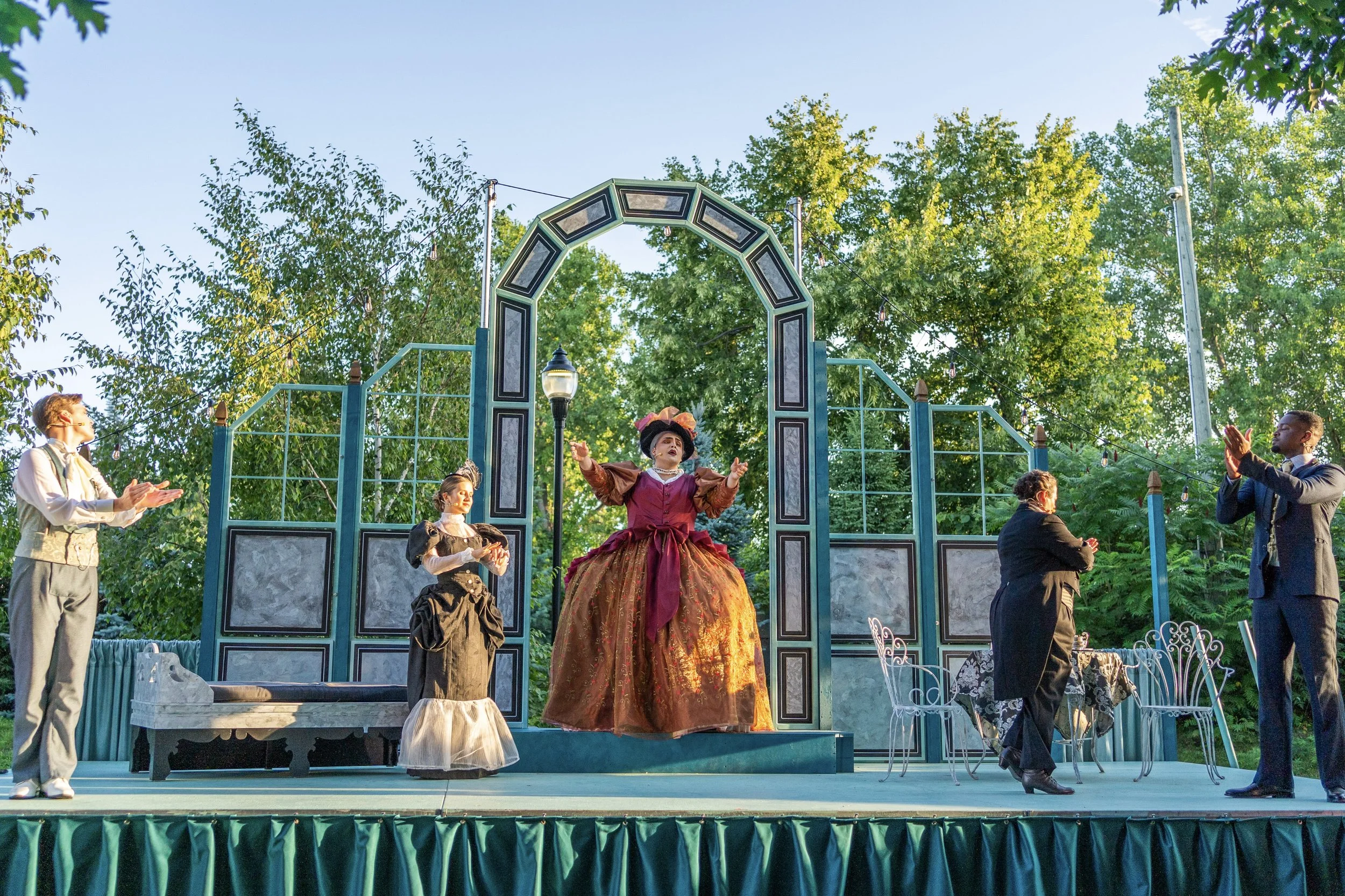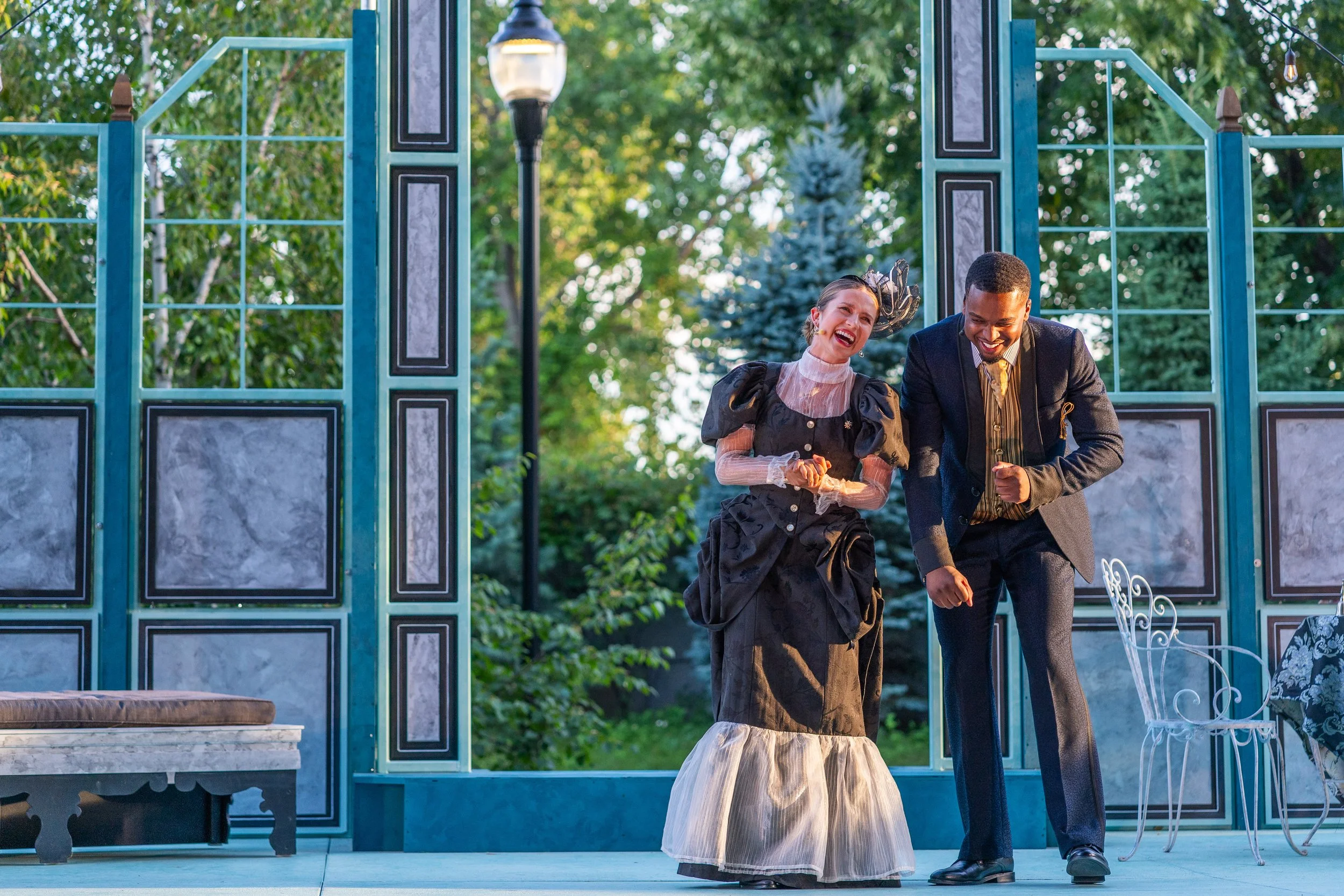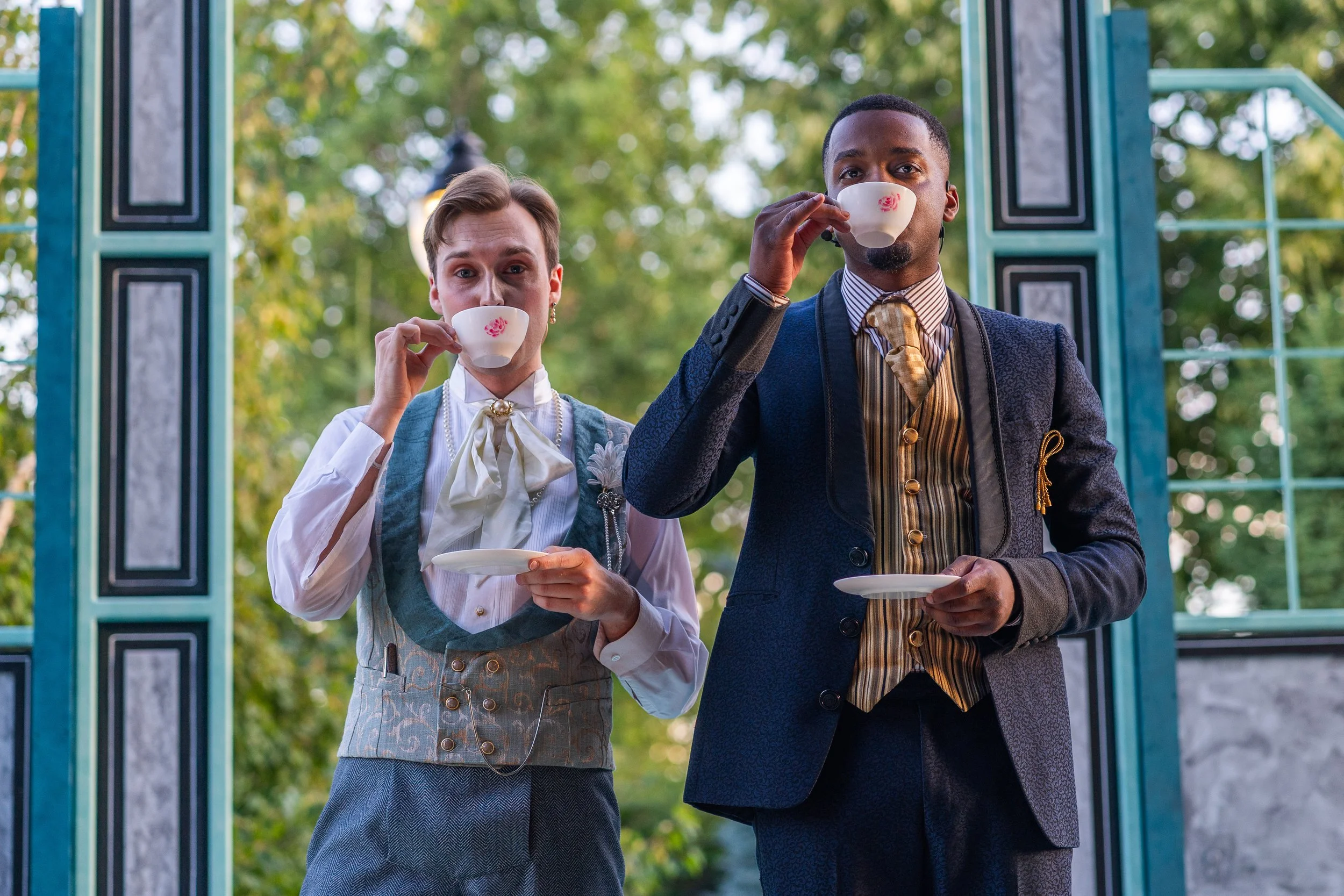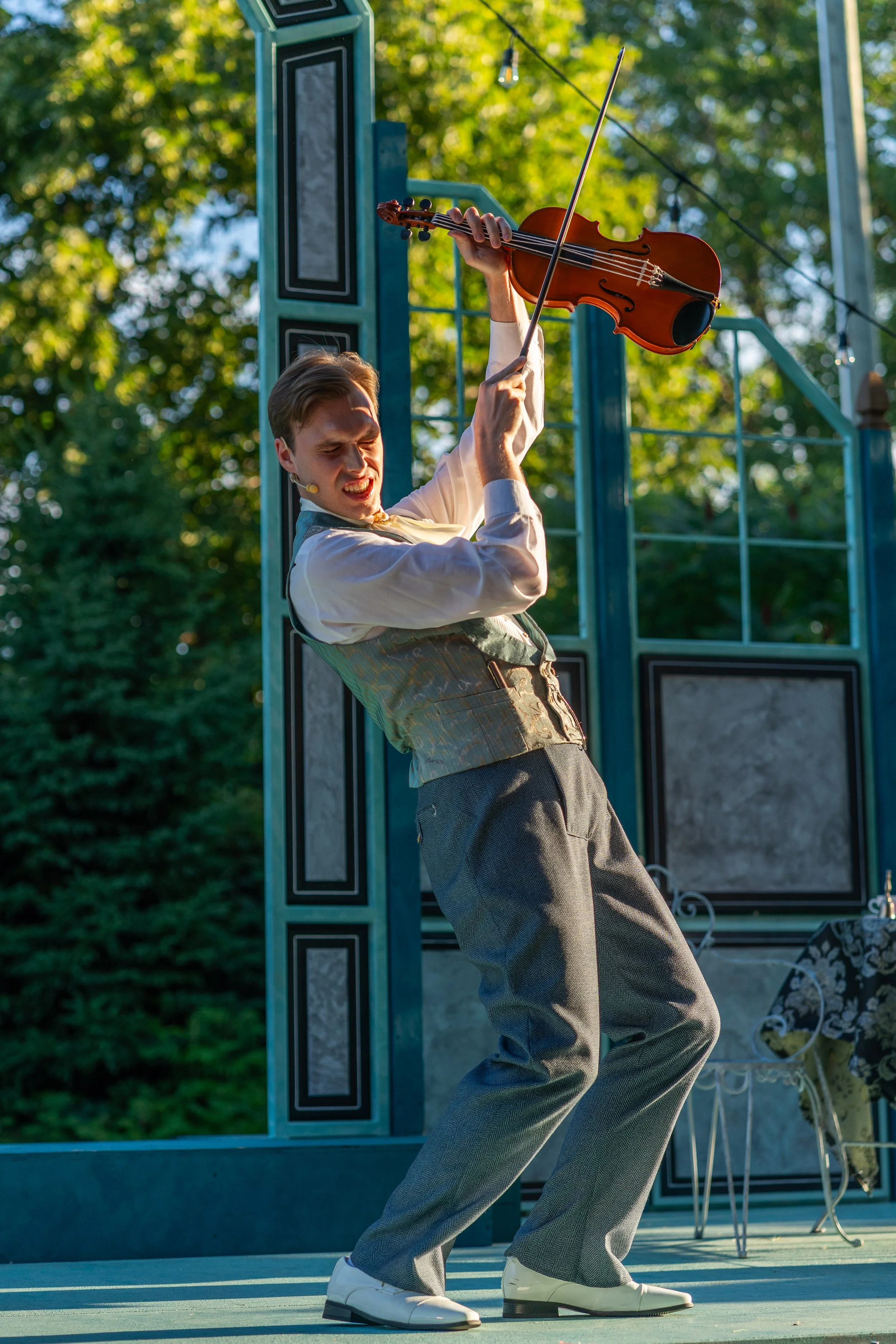Wilde in the Wild
The Entertaining and Earnest Summer Production
Before smoke from the prairie wildfires choked out the blue summer sky, I waited behind the Gothic gates to the Mount-Royal cemetery. My friend, Andrew, quickly arrived, and I began loudly pronouncing that we needed a spot as close to the stage as possible. The area in front of the stage was already lousy with people, in camping chairs or — more commonly — lounging on picnic blankets with cheese plates and chilled summer beverages. Many attendees wore bloused shirts with fitted waistcoats and other Victorian attire — Catherine Savoie, the new Artistic Director for Repercussion Theatre, had extended the invitation via mass media e-mail to dress in our finest dandy outfits. The best I could do was an enormous wine-red crinoline tutu. It was in this very silly outfit that I staked out a bare patch of grass very close to the stage.
Carter Gulseth as Algernon
The piece opens in a way that I believe I remember as a motif from previous summers with Repercussion: a piece of period-appropriate classical music plays, which cuts to a modern electronic beat, as if to signal, This is not regular Shakespeare. This is cool Shakespeare.
Except that this is not Shakespeare at all: we were gathered to see Oscar Wilde’s 1895 masterpiece The Importance of Being Earnest. Repercussion, which almost exclusively does Shakespeare in the Park, has done non-Shakespeare a few times before — their 2007 production of Moliére’s Les fourberies de Scapin comes to mind. This year the company has teamed up with Persephone Productions to bring us another classic. When I interviewed Catherine Savoie in advance of the production, I asked what it was about this show that was relevant now, and the answer she gave me was more or less that in a time where democracy and human decency seems more and more eroded by the influence of big money, there’s never been a better time to make fun of rich people.
Our heroes are Algernon and Jack, whose friendship is maintained by the sacred trinity of male bonding: being fancy, cucumber sandwiches, and telling lies to women. Gulseth’s Algernon is explicitly homosexual: his “aversion to marriage” is played for laughs as being a direct result of not just his class-appropriate disregard for the basic human value of women, as it appears in Wilde’s text, but his complete lack of sexual or romantic interest in women. This confounds some of the drama, later, in a way that Andrew — who knows the show intimately, and has played Algernon twice — elaborates on at intermission.
“You don’t have to make it gayer than it already is,” he says, smoking by the port-a-potties. “That’s the joke! It’s a satire written by a gay man about heterosexuality and the upper classes — how once you have enough money, it becomes imperative to never tell anyone the truth. Least of all whoever you’re married to.”
As the show plays out, I see his point: in the text, men treat women like they’re attractive, silly furniture, undeserving of earnestness (get it?) because they’re not really people. This is ultimately fine, because the women aren’t much better: they treat men like objects that are conveniently slotted into pre-existing romantic fantasies that have little-to-nothing to do with who the men actually are, as people, and much more to do with validating however the women want to feel about themselves. Each wants a mate who reflects their status in society. Telling the truth is basically arbitrary.
I can’t help but feel, reflecting now, that the philosophical through-line of the satire is lost in the production's consistent attempts to modernize and yassify. I did not, however, much care while the play was happening, because this is a production of consistently spectacular performances: Gulseth is a truly remarkably fabulous physical comedian, whose heavily affected Algernon speaks in a veritable symphony of voice and gesture.




Wanting very much to retain my impression of the performance, I make an argument on the long walk home. We wind down the mountain, the streetlights swelling with more and more East-blowing smoke. “It’s 2025,” I advocate to Andrew. “Surely, someone can both be a raging homosexual and also fall in love with a woman?”
“I didn’t believe it,” said Andrew. “Did you?”
I have to admit that I did not. I don’t believe that Gulseth’s Algernon loves Cecily — who is played with a delightful kind of impish insanity by Mara Lazaris. Lazaris plays Cecily as a pathological daydreamer on the brink of sanity, for whom the complete dishonesty of her partner is not at all a problem, because the only relationship she cares about happens entirely inside of her own delusional head. Lazaris’s best chemistry is with Juliana Monk, who plays tight-ass rich girl Gwendolyn with a kind of precise intensity that immediately ramps the tension up to 11 in every scene she’s in.
The standout was definitely Theodore Vlachos, perhaps better known by his drag name Agusta Wind. Vlachos is a terrific performer — in drag, as Lady Bracknell, he was the beating heart of the play — filling up the role of a very silly, not very nice woman with a kind of warmth and charm that made me fall completely in love with her. Even Andrew — a staunch traditionalist, a Wilde scholar, a bit of an asshole — admitted that she may have been the best Lady Bracknell he’d seen. Other performers who may or may not have had serious enunciation problems shall, for the sake of this review, remain nameless — provided that they get their cheek muscles better warmed up before the rest of the run. Step to it, young man, I can edit this at any time.
I keep coming back to this: in this modern age, in the middle of a genocide, more than halfway to a fourth reich, is a little thing like homosexuality really an obstacle to true love, or whatever it is that rich people feel instead? I suppose it will be up to each audience member to decide. The Importance of Being Earnest, directed by Rebecca Gibian and Adam Capriolo, runs in parks across the Island for the rest of the summer.
For the full schedule of The Importance of Being Earnest by Repercussion Theatre and Persephone Productions, visit the Repercussion Theatre website.
If you’re reading Forget The Box, you’re a supporter of free, independent arts coverage. We ask you to take a moment to consider donating $1 to help us continue our mission to spotlight ground level, underground, and marginalized art in Montreal. Every little bit helps.



